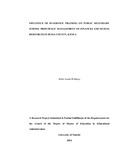| dc.description.abstract | The study sought to determine the extent to which exposure to management training by KEMI, attendance of annual conferences and pursuit of higher education influences principals effectiveness in management of management of finances and human resources. The study was based on the human capital theory originally proposed by Schutz in 1961. The study employed the descriptive survey research design. It targeted all the 100 secondary schools in the county. The study targeted all the 100 public secondary schools in the county. Simple random sampling was used to get 40 principals and stratified random sampling to get 284 teachers as the respondents. Two questionnaire sets were used to collect the required information from the principals and the teachers. Data was analyzed using the Statistical Package for Social Sciences (SPSS) which was used to generate the frequencies, descriptive and ANOVA statistics that were used to answer the research questions. It was established that that KEMI’s programme for the principals effectively addressed Management of teaching staff (n=32, mean 1.7812), the budgetary process (n=32, mean 1.7812); Management of staff discipline (n=32, mean 1.7812); Management of support staff (n=32, mean 1.8437); Budget control (n=32, mean 1.8750; recruiting process(n=32, mean 2.00); Handling of disadvantaged groups like HIV positive staff (n=32, mean 2.0625); Staff appraisal (n=32, mean 2.0937); Handling of the staff welfare (n=32, mean 2.1563); Auditing (n=32, mean 2.1875); Management of income generating activities (n=32, mean 2.2812); Staff training and development plan (n=32, mean 2.2813); Resource mobilization (n=32, mean 2.3125) and the general running of the school. The annual conferences were only effective in addressing Management of teaching staff (n=32, mean= 2.1250), Management of supporting staff (n=32, mean= 2.1875) and Resource mobilization (n=32, mean= 2.3125). the principal’s level of education had no influence on their management of finances (p>0.05) and human resources (p>0.05). it was also established that the principal’s pursuit of higher education had no influence on their management of finances and human resources (p>0.05). Some of the challenges that principals faced in day to day school operation include high BOG drawings, fraud in their accounts department, salary delays for workers, lack of parents support, collection of fees, incompetence of the accountants, rising food prices, delay in disbursement and inadequate funding. Further research was suggested on factors that affect effective human and financial management in secondary schools. | en_US |

